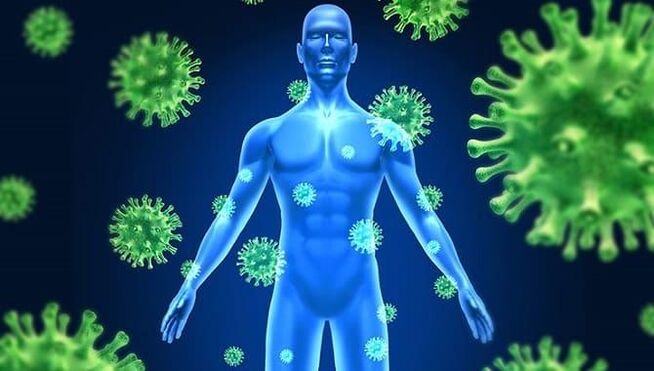Parasitic diseases are a group of pathologies caused by microorganisms, arthropods and worms. They differ in a slow course and impact on vital systems. Digestive disorders, changes in body weight, chronic fatigue are the main signs of the presence of parasites in the human body. To diagnose invasive diseases, an ultrasound of the peritoneal organs, an analysis of feces for dysbiosis and a biochemical blood test are performed.
What parasites can live in a person
The causative agents of parasitic pathologies are worms, arthropods and unicellular organisms - viruses, fungi, protozoa. In 69% of cases, helminthic invasions are diagnosed, which are provoked by such helminths:
- trematodes (fluke) - schistosomes, feline and hepatic fluke;
- scrapers (acanthocephalosis) - pearl-shaped scraper, giant comb;
- nematodes (roundworms) - hookworms, pinworms, roundworms, whipworms;
- cestodes (strip) - broad tapeworm, bovine tapeworm, echinococcus.
Endoparasites predominate among helminthic invasions, which are deposited in the small or large intestine. Common arthropod pathogens of parasitic diseases include:
- ticks;
- centipede;
- reed;
- insects.
The group of temporary parasites includes blood-sucking arthropods and leeches, and the group of permanent parasites includes lice, parasitic worms and itchy mites. Very often invasive pathologies are caused by opportunistic fungi, protozoa - amoeba, lamblia.

Parasites negatively affect the body, causing unwanted systemic effects - poisoning with waste, gastrointestinal dysfunction, allergies, anemia.
Common signs of helminths
Symptoms depend on the type, location, and amount of the parasite in the body. The basis of the clinical picture is the immune response to infection with parasitic infection and damage to individual organs.
Digestive issues
Disorders of the gastrointestinal tract are mainly caused by parasitic worms, localized in the small intestine. Their wastes cause an allergic reaction in the body, narrowing of the bile ducts. As a result, there are complaints about:
- indigestion;
- bloating;
- sour belching;
- little appetite.
More than 80% of patients suffer from constipation, diarrhea and gas.
Stomach ache
Abdominal pain and a feeling of heaviness in the abdomen are obvious signs of parasites in the body. They irritate the receptors in the gastrointestinal mucosa, causing spastic contraction of smooth muscles. As a result, abdominal pain occurs.
If the fluke parasites act as provocateurs of invasive disease, abdominal discomfort occurs due to their introduction into the intestinal wall.
Anal itching
Periodic itching in the anal area and painful stools are the first signs of parasites in the body. Symptoms are mainly caused by pinworms, less often by roundworms. The former lay eggs in the anus, which causes severe itching.
The lifespan of pinworms is only 1. 5 months. Parasite eggs have a protective shell, so they are not destroyed by external factors.

Failure to observe hygiene leads to self-infection, an increase in the number of worms in the body.
Change in body weight
An increase or decrease in body weight is a clear sign that the parasites are in the body. Weight fluctuations are the result of:
- increased or decreased appetite due to intoxication;
- Metabolic disorders;
- intestinal dysbiosis.
In half of the cases, patients complain of a constant feeling of hunger. But if the parasites are localized in the small intestine, more than 70% of the nutrients do not enter the bloodstream.
Blood in stool
The signs of parasite infestation depend on the causative agent of the invasive disease. The presence of blood and mucus in the stool indicates intestinal damage:
- human roundworm;
- wide ribbon;
- pinworms.
Entering the body, the parasites cause intestinal irritation. Inflammation of the walls causes hemorrhage and mixing of blood with feces.
Skin changes
Allergic reactions are the most pronounced signs of parasites in the human body. According to statistics, massive invasions cause toxic allergic changes in 92% of patients:
- itchy skin;
- abscess;
- red dots;
- yellowing;
- peeling;
- dry skin.
Yellowing of the skin indicates stagnation of bile in the body, increased activity of liver enzymes.
Decreased immunity
Helminthiasis in adults is accompanied by dysbiosis. Over 75% of immune tissue is found in the gastrointestinal tract, so parasitic disease leads to secondary immune deficiencies. A decrease in the body's resistance to infections is indicated by:
- frequent colds;
- long-term healing of cuts and abrasions;
- regular exacerbations of chronic pathologies.

Parasites deplete the body's protective reserves, reducing the production of antibodies against viruses, fungi and bacteria.
Allergy
Worms poison the body with the products of their vital activity. Poisoning leads to autoimmune diseases, which are manifested by allergic effects:
- itchy skin;
- bronchospasm;
- rash on the body.
The most pronounced toxic allergic reactions cause roundworms, trichinella and echinococci.
Joint and muscle pain
Myalgia and arthralgia - muscle and joint pain - are signs of the presence of parasites in the human body. During the migration stage, the helminth larvae are carried by the bloodstream. Many of them settle in joint fluid and muscles, causing painful sensations.
Palpitations
Parasitic toxins negatively affect the functioning of the cardiovascular system. Massive helminthic invasions cause:
- tachycardia (rapid heartbeat);
- hypertension.
Dangerous complications are provoked by representatives of tapeworms - echinococci. They form echinococcal cysts not only in the heart, but also in the lungs.
Hair loss
Poor absorption of substances from the intestines leads to a lack of many vitamins and metabolic disorders. Therefore, the frequent companions of parasitic diseases are:
- dull hair;
- excess oily scalp;
- alopecia (hair loss).

A deficiency of vitamins and minerals leads to relapses of oily seborrhea, which in many cases causes irreversible hair loss.
Change taste preferences
The violation of the perception of taste (dysgeusia) when the body is affected by parasites is due to a change in the protein composition of the blood, hypovitaminosis.
What are the signs of dysgeusia:
- unpleasant taste in the mouth;
- cravings for sweets;
- dull taste;
- burning sensation in the mouth.
Taste disturbances are often associated with gastrointestinal illnesses caused by parasitic worms.
Chronic fatigue syndrome
Metabolic disorders, deficiency of vitamins and other useful components lead to a decrease in the energy reserve of the body, liver disorders. Therefore, patients with invasive diseases complain of:
- rapid fatigue;
- constant drowsiness;
- distraction;
- lethargy.

The feeling of tiredness does not go away even after a long rest or a long sleep.
Avitaminosis
Avitaminosis is the absence of vitamins in the body. It occurs when the parasites are localized in the small intestine. The symptoms depend on the missing vitamin. More often, patients complain of:
- dizziness;
- decreased visual acuity;
- frequent nausea;
- headache;
- deterioration of the skin.
Long-term vitamin deficiencies are dangerous due to the dysfunction of vital organs.
Anemia
Anemia or anemia - a decrease in the concentration of hemoglobin in blood cells. When the body is damaged by parasites, there is a deficiency of vitamins, which are involved in the synthesis of hemoglobin and erythrocytes:
- folic acid;
- cyanocobalamin;
- vitamin C.

Anemia with helminthiasis is manifested by shortness of breath, headache, loss of appetite, tinnitus.
Nervousness, sleep disturbances
Infection with parasites in humans is manifested by intoxication, which adversely affects the functioning of the nervous system. Subsequently, there are complaints about:
- a sharp change in mood;
- anger;
- depressed state;
- sleep disorder.
Emotional lability against the background of hypovitaminosis and anemia is a clear sign of bodily harm from parasitic worms.
Deterioration of memory and attention
Cognitive impairment - a decrease in intellectual abilities, memory and attention - occurs against the background of chronic poisoning of the body with the products of the vital activity of parasites. Helminthiasis cause disturbances in the work of many organs, causing pain to the nervous system and brain tissue. But in 94% of cases, cognitive disorders are reversible.
Cough
A dry cough without accompanying symptoms of ENT disease is one of the signs of a parasitic infection. In 8 out of 10 cases, an unproductive cough is caused by:
- human roundworm;
- lung fluke.
During the migration phase, the larvae of the worms enter the lungs. When coughing, roundworms enter the oral cavity, after which they are swallowed and deposited in the intestines.
Other signs
Additional symptoms of invasive disease include:
- increased body temperature;
- enlarged liver;
- bad breath;
- obstructive jaundice;
- yellow coating on the tongue;
- bronchospasm;
- isolation of worm fragments with feces;
- agitated sleep;
- chest pain;
- increased gas formation;
- vaginitis in women;
- pain in the right side.

With brain damage, neuroses, mental disorders are possible.
Symptoms of infection with other types of parasites
The clinical picture depends on the causative agent of the parasitic disease.
| Form of disease | Symptoms |
| giardiasis | nausea, belching, itching, gas, fever |
| Pediculosis | itchy scalp, burning in the bite of the lice, red spots and lumps on the head, insomnia, nits in the hair |
| yeast infection | skin peeling, nail damage, sour odor, thickening of the skin, cracks |
| amoebiasis | abdominal pain, gagging, bloody stools, lack of appetite. |
There are many signs of invasive damage to the body. To exclude complications, it is recommended to do a blood test for parasites at least once a year.
Why are untreated parasite infestations dangerous?
Parasitic infections have a systemic effect on the body, disrupting the functions of all organs. Delayed treatment leads to:
- intestinal obstruction;
- pancreatitis;
- prolapse of the rectum;
- lymphadenitis;
- myocarditis;
- bronchopneumonia;
- cholecystitis;
- endometritis;
- pleurisy;
- stomach ulcer;
- meningoencephalitis;
- heart failure;
- purulent peritonitis.
In the presence of chronic diseases, parasites complicate their course. Ignoring invasive disease is dangerous with disability and even death.
Diagnosis and treatment
Laboratory tests are used to identify parasites:
- scratching for enterobiosis;
- coprogram;
- analysis of feces for the egg leaf;
- immunoenzymatic assay of antibodies against parasites.
In case of intestinal invasions, an instrumental examination is recommended - ultrasound of the peritoneal organs, colonoscopy and liver scintigraphy.
The effectiveness of anthelmintic therapy is determined on the basis of the results of repeated diagnostics, carried out 1 month after treatment.
Depending on the results of the diagnosis, antiparasitic drugs are prescribed:
- anti-nematodic;
- against trematodes;
- protivocestodozny;
- broad spectrum anthelmintics;
- antifungal;
- bug spray;
- remedies for scabies mites.
Parasitic cysts (such as echinococcal cysts) are removed surgically.
Clinical manifestations and methods of treatment of parasitic diseases depend on the type of pathogen. Parasites enter the body through natural openings - mouth, skin pores, urethra, etc. Timely diagnosis and treatment of invasive pathologies prevents complications - meningitis, peptic ulcer, myocarditis.






































